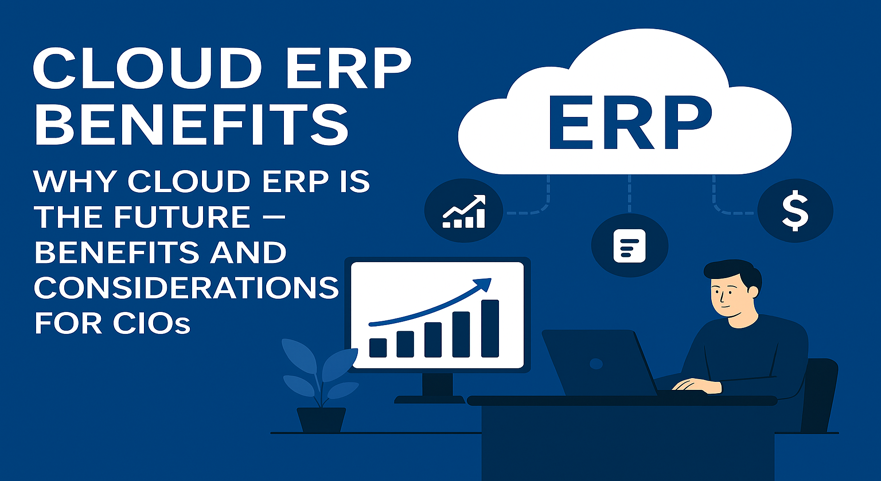Cloud ERP Benefits: Why It’s the Future – A Simple Guide for CIOs

Cloud ERP is quickly becoming the backbone of modern enterprise operations. With the increasing demand for efficiency, agility, and real-time visibility, CIOs are turning to cloud-based ERP systems to lead their organizations through digital transformation. This blog explores the top Cloud ERP benefits for CIOs and why adopting such solutions is a strategic move for future-ready businesses.
☁️ What is Cloud ERP?
Cloud ERP refers to enterprise resource planning software hosted on cloud servers and accessed over the internet. Unlike traditional ERP systems, which require on-premise infrastructure, Cloud ERP platforms offer remote access, automatic updates, and minimal IT overhead. This makes them ideal for CIOs looking to scale operations without increasing complexity.
By understanding Cloud ERP benefits for CIOs, businesses can make informed decisions about upgrading their technology stack. The biggest Cloud ERP benefits for CIOs include increased speed of deployment, flexibility, and digital scalability.
🚀 Why CIOs are Choosing Cloud ERP
The shift to cloud is not just a trend—it’s a necessity. Here are key Cloud ERP benefits for CIOs:
- ✅ Cost Reduction
- Eliminate the need for expensive servers, IT maintenance, and upgrades.
- ✅ Real-Time Access
- Get live business insights from any location or device.
- ✅ Scalability
- Easily expand ERP capabilities as your business grows.
- ✅ Security & Compliance
- Built-in data protection, encryption, and regulatory standards.
- ✅ Faster Decision-Making
- Dashboards and analytics tools deliver instant insights.
These Cloud ERP benefits for CIOs make it clear why cloud adoption is accelerating across industries.
💻 Strategic Advantages of Cloud ERP for CIOs
Cloud ERP empowers CIOs to:
- Align IT with business goals
- Enable mobility and remote access for teams
- Improve collaboration across departments
- Standardize processes across global locations
Moreover, Cloud ERP benefits for CIOs include vendor-managed updates, reducing the burden of software maintenance and downtime. Emphasizing Cloud ERP benefits for CIOs in terms of IT resource optimization and automation also strengthens strategic goals.
🧠 Key Considerations Before Implementing Cloud ERP
While the advantages are clear, CIOs must carefully evaluate the following before implementation:
- ⚖️ Integration: Will the new system work with existing software?
- 📂 Data Migration: Can current data be transferred securely?
- ✅ User Training: Is your team ready to use the new platform?
- 🔒 Compliance: Does the ERP meet industry standards (GDPR, HIPAA, etc.)?
Understanding these aspects ensures the Cloud ERP benefits for CIOs are fully realized. CIOs who take a holistic approach will gain more from Cloud ERP benefits in governance and innovation.
📊 NetSuite ERP: A Leading Cloud ERP Solution
Among the most trusted Cloud ERP platforms, NetSuite ERP stands out. It offers a unified solution for finance, CRM, inventory, and HR, all accessible from a single dashboard. For CIOs, it delivers scalability, reliability, and global support—everything needed for digital transformation.
If you’re evaluating Cloud ERP benefits for CIOs, NetSuite is a strong contender. Many CIOs report significant improvements in data accuracy, reporting speed, and business continuity—further showcasing Cloud ERP benefits for CIOs in real-world use cases.
✅ Conclusion
Cloud ERP is not just an upgrade—it’s a competitive advantage. The top Cloud ERP benefits for CIOs include cost-efficiency, real-time data, scalability, and ease of management. As businesses grow and the need for agile technology increases, cloud ERP solutions will continue to dominate the enterprise landscape.
Adopting these systems gives CIOs greater control, visibility, and innovation power—making Cloud ERP benefits for CIOs a defining factor in digital success.
🙌 Need Help with Cloud ERP Implementation?
Tech i-vin Technology helps companies of all sizes implement Cloud ERP platforms like NetSuite ERP. Whether you’re just exploring or ready to migrate, our expert team is here to support your journey.
📞 Contact us today to discuss your ERP strategy.
